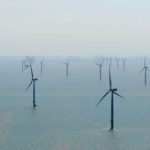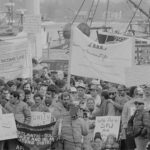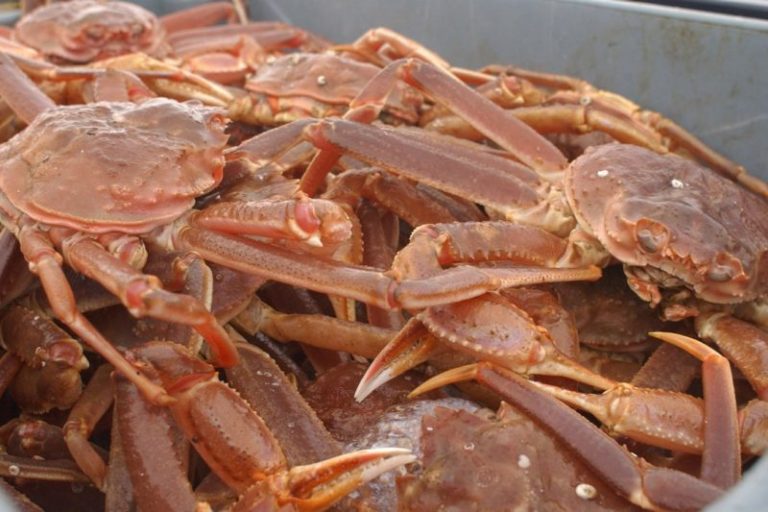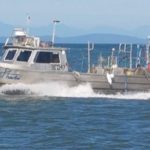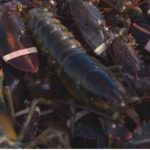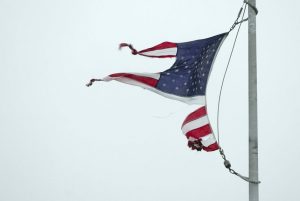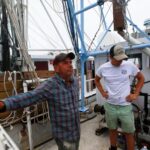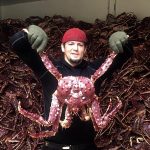Daily Archives: March 1, 2017
The deadliest cast: Creating a batch of rubber crabs
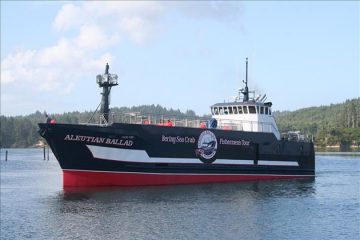 On the Discovery Channel’s hit show, “Deadliest Catch,” Derrick Ray is a captain for one of Alaska’s most successful and beloved crab fishing ships, the Aleutian Ballad. During the offseason for crabbing each summer,Ray and his crew take customers on the high seas to simulate the experience — at least without the rough weather, long hours and extreme danger. A staple of the Bering Sea Crab Fisherman’s Tour is that the customers get to see the massive 10-pound crabs up close. Every year, the team keeps between 500 and 800 of these crabs in tanks for the tourists during the summer. During every tour season, many of the crabs do not survive. And when they die, they start to rot and smell, then must be thrown away. Not only does the high value of the crabs cut into the company’s bottom line, but the whole process is also wasteful. Ray and his company wanted a more sustainable approach. Rubber crabs! Read this interesting article about 3-D printing here 20:26
On the Discovery Channel’s hit show, “Deadliest Catch,” Derrick Ray is a captain for one of Alaska’s most successful and beloved crab fishing ships, the Aleutian Ballad. During the offseason for crabbing each summer,Ray and his crew take customers on the high seas to simulate the experience — at least without the rough weather, long hours and extreme danger. A staple of the Bering Sea Crab Fisherman’s Tour is that the customers get to see the massive 10-pound crabs up close. Every year, the team keeps between 500 and 800 of these crabs in tanks for the tourists during the summer. During every tour season, many of the crabs do not survive. And when they die, they start to rot and smell, then must be thrown away. Not only does the high value of the crabs cut into the company’s bottom line, but the whole process is also wasteful. Ray and his company wanted a more sustainable approach. Rubber crabs! Read this interesting article about 3-D printing here 20:26
2016 Annual Report of the Atlantic States Marine Fisheries Commission
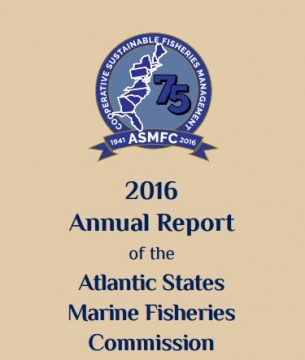 Report to Our Stakeholders Robert E. Beal – On behalf of the Commission and the 15 Atlantic coastal states, I am pleased to present our 2016 Annual Report. The report fulfills our obligation to inform Congress on the Commission’s use of public funds, provides our stakeholders with a summary of activities and progress in carrying out our cooperative stewardship responsibilities, and reflects our Commissioners’ commitment to accountability and transparency in all they do to manage and rebuild fisheries under their care. We remain grateful to the Administration, Members of Congress, our governors and state legislators for their continued support. Many of our accomplishments would not have been possible without their trust and confidence. Read the report here 16:03
Report to Our Stakeholders Robert E. Beal – On behalf of the Commission and the 15 Atlantic coastal states, I am pleased to present our 2016 Annual Report. The report fulfills our obligation to inform Congress on the Commission’s use of public funds, provides our stakeholders with a summary of activities and progress in carrying out our cooperative stewardship responsibilities, and reflects our Commissioners’ commitment to accountability and transparency in all they do to manage and rebuild fisheries under their care. We remain grateful to the Administration, Members of Congress, our governors and state legislators for their continued support. Many of our accomplishments would not have been possible without their trust and confidence. Read the report here 16:03
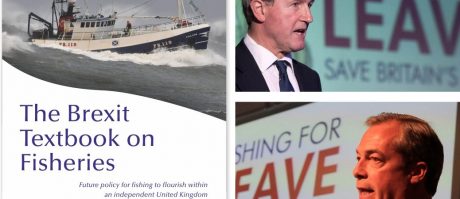
Fishing For Leave – First Brexit Policy Released
Fishing for Leave released one of the first detailed 144-page Brexit policy documents this Tuesday in Westminster with Nigel Farage MEP and former Secretary of State Owen Paterson MP. The policy paper clearly details the realities of Brexit to ensure the UK regains all fisheries waters and resources automatically with nothing to negotiate. Speaking to the 30 national journalists FFL said “We have devised future policy to ensure the UK takes advantage of the clean slate afforded by the terms of Article 50, that the ‘treaties shall cease to apply’ and therefore the CFP too”. “We cannot adopt any element of the disastrous CFP into UK law as proposed with the Great “Repeal” Bill as this would bind us to the CFP, betraying Brexit for political convenience and a small minority of vested interests”. “This policy details a bold new approach to manage UK fisheries sustainably by eliminating the cause of discards, EU Quotas, and replacing them with Days-at-Sea whilst preserving current entitlement investments”. “We have a golden opportunity to become world leaders with Brexit. This policy proposes sustainable management with Days-at-Sea that works for everyone regardless of whether you are the smallest boat or biggest company whilst providing a stable transition”. continue reading the rest here 15:27
N.J. lawmakers ask Trump’s new commerce secretary to stop flounder cuts
 It’s not clear how much Wilbur Ross knows about fishing or the complex world of marine regulations. But some members of New Jersey’s congressional delegation hope Ross, who was sworn in as secretary of commerce Tuesday, will step into an intense fight over summer flounder catch guidelines. The delegation wasted no time in appealing to Ross, who now oversees the agencies tasked with regulating the fishing industry. A bipartisan letter sent Tuesday and signed by 12 New Jersey lawmakers, including both U.S. senators and U.S. Rep. Frank LoBiondo, R-2nd, asked the former billionaire businessman to considering putting approved flounder reductions on hold. Last month, a federal regulatory commission voted in favor of an option to cut fluke limits for recreational and commercial fishermen by 28 percent to 32 percent for 2017. continue reading the story here 15:06
It’s not clear how much Wilbur Ross knows about fishing or the complex world of marine regulations. But some members of New Jersey’s congressional delegation hope Ross, who was sworn in as secretary of commerce Tuesday, will step into an intense fight over summer flounder catch guidelines. The delegation wasted no time in appealing to Ross, who now oversees the agencies tasked with regulating the fishing industry. A bipartisan letter sent Tuesday and signed by 12 New Jersey lawmakers, including both U.S. senators and U.S. Rep. Frank LoBiondo, R-2nd, asked the former billionaire businessman to considering putting approved flounder reductions on hold. Last month, a federal regulatory commission voted in favor of an option to cut fluke limits for recreational and commercial fishermen by 28 percent to 32 percent for 2017. continue reading the story here 15:06
Furuno’s new Multi-Beam Sonar
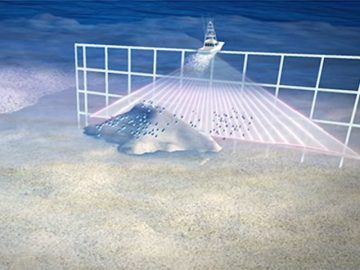 Furuno is proud to announce that it is bringing side-scanning capabilities to its flagship NavNetTZtouch and TZtouch2 MFDs with its latest network sensor called the DFF3D. This multi-beam Sonar takes the highly-desired capability to scan port to starboard under the vessel and adds Furuno’s commercial fisheries spin on it. This deep-water Sonar delivers a sidebar detection range of an unprecedented 650+ feet, while being able to see down to over 1,000 feet. The DFF3D utilizes a new, compact multi-beam transducer, along with Furuno’s own advanced signal processing, to produce eye-popping images that will help you find and track fish. The transducer and fairing block is only 14 inches long, which makes this a perfect fit for boats of all sizes. To top it off, the transducer features a built-in motion sensor, which keeps the images stable, even in rough seas. continue reading the article here 13:18
Furuno is proud to announce that it is bringing side-scanning capabilities to its flagship NavNetTZtouch and TZtouch2 MFDs with its latest network sensor called the DFF3D. This multi-beam Sonar takes the highly-desired capability to scan port to starboard under the vessel and adds Furuno’s commercial fisheries spin on it. This deep-water Sonar delivers a sidebar detection range of an unprecedented 650+ feet, while being able to see down to over 1,000 feet. The DFF3D utilizes a new, compact multi-beam transducer, along with Furuno’s own advanced signal processing, to produce eye-popping images that will help you find and track fish. The transducer and fairing block is only 14 inches long, which makes this a perfect fit for boats of all sizes. To top it off, the transducer features a built-in motion sensor, which keeps the images stable, even in rough seas. continue reading the article here 13:18
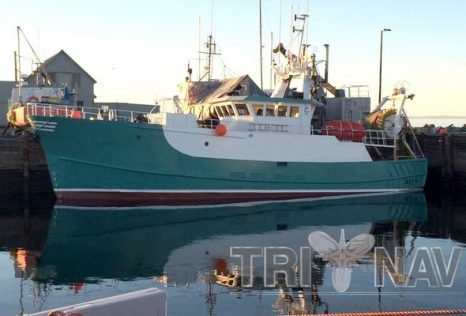
Athearn Marine Agency Boat of the Week: 82ft Steel Dragger, 3412 Caterpillar
Specifications, information and 33 photo’s click here To see all the boats in this series, Click here 12:32
Spiny Lobster season in the Florida Keys: Not as strong, not a disaster
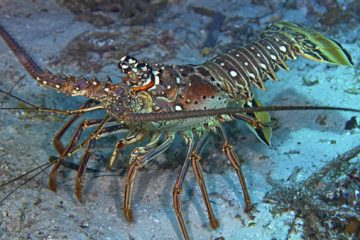 One month remains in the regular lobster season but many of the traps put out by the Florida Keys commercial fleet are back on the hill — meaning pulled ashore until next summer. “We’re bringing in about 235 traps now from 200 feet of water,” Conch Key commercial fisherman Gary Nichols said Tuesday. “This season has been kind of fairly good,” Nichols reported from aboard his 43-foot boat. “It’s not as good as the last couple of years and the market has been softer.” Tom Hill at Key Largo Fisheries agreed, “It hasn’t been a bad year, but it’s not as robust as it has been. I think we have had less production than in the past few seasons.”,, The Asian market for live Florida lobster, which buoyed the fleet after the economic recession, remains a critical component of the fishing economy but was not as profitable as in the past seven to eight years. continue reading the story here 10:17
One month remains in the regular lobster season but many of the traps put out by the Florida Keys commercial fleet are back on the hill — meaning pulled ashore until next summer. “We’re bringing in about 235 traps now from 200 feet of water,” Conch Key commercial fisherman Gary Nichols said Tuesday. “This season has been kind of fairly good,” Nichols reported from aboard his 43-foot boat. “It’s not as good as the last couple of years and the market has been softer.” Tom Hill at Key Largo Fisheries agreed, “It hasn’t been a bad year, but it’s not as robust as it has been. I think we have had less production than in the past few seasons.”,, The Asian market for live Florida lobster, which buoyed the fleet after the economic recession, remains a critical component of the fishing economy but was not as profitable as in the past seven to eight years. continue reading the story here 10:17
Wind energy is not the answer
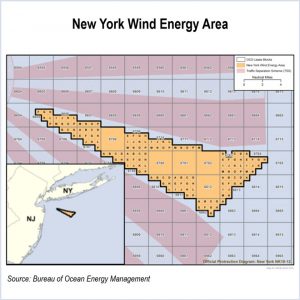 Urban voters may like the idea of using more wind and solar energy, but the push for large-scale renewables is creating land-use conflicts in rural regions from Maryland to California and Ontario to Loch Ness. Since 2015, more than 120 government entities in about two dozen states have moved to reject or restrict the land-devouring, subsidy-fueled sprawl of the wind industry.,, If the wind lobby and their myriad allies at the Sierra Club, Natural Resources Defense Council and other environmental groups acknowledge turbines’ negative effects on landscapes and rural quality of life, it would subvert their claims that wind energy is truly green.,, In New York, angry fishermen are suing to stop an offshore wind project that could be built in the heart of one of the best squid fisheries on the Eastern Seaboard. Read the article here 09:44
Urban voters may like the idea of using more wind and solar energy, but the push for large-scale renewables is creating land-use conflicts in rural regions from Maryland to California and Ontario to Loch Ness. Since 2015, more than 120 government entities in about two dozen states have moved to reject or restrict the land-devouring, subsidy-fueled sprawl of the wind industry.,, If the wind lobby and their myriad allies at the Sierra Club, Natural Resources Defense Council and other environmental groups acknowledge turbines’ negative effects on landscapes and rural quality of life, it would subvert their claims that wind energy is truly green.,, In New York, angry fishermen are suing to stop an offshore wind project that could be built in the heart of one of the best squid fisheries on the Eastern Seaboard. Read the article here 09:44
It’s good business to keep Bristol Bay protections
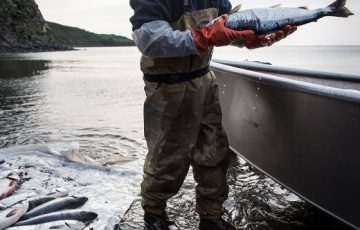 Regulations are in the crosshairs in Washington, D.C. these days. Those elected officials and appointed agency leaders have been clear in their goal to get rid of regulations they say are blocking jobs and economic activity. I humbly suggest that in this flurry to slash red tape, one Environmental Protection Agency protection should stay in place: the one protecting the Bristol Bay fishery in Alaska from the controversial Pebble Mine. I guarantee you the EPA’s plan to restrict mine waste disposal in Bristol Bay waters protects jobs and economic activity: those of my family and the 14,000 others who rely on our nation’s most valuable salmon fishery. In fact, we Alaskans call the sockeye salmon that return to Bristol Bay in their annual spawning runs “red gold.” Bristol Bay is the largest wild salmon fishery remaining anywhere in the world. For thousands of years, those fish have represented not just survival, but wealth. continue reading the op-ed here by Kim Williams 09:08
Regulations are in the crosshairs in Washington, D.C. these days. Those elected officials and appointed agency leaders have been clear in their goal to get rid of regulations they say are blocking jobs and economic activity. I humbly suggest that in this flurry to slash red tape, one Environmental Protection Agency protection should stay in place: the one protecting the Bristol Bay fishery in Alaska from the controversial Pebble Mine. I guarantee you the EPA’s plan to restrict mine waste disposal in Bristol Bay waters protects jobs and economic activity: those of my family and the 14,000 others who rely on our nation’s most valuable salmon fishery. In fact, we Alaskans call the sockeye salmon that return to Bristol Bay in their annual spawning runs “red gold.” Bristol Bay is the largest wild salmon fishery remaining anywhere in the world. For thousands of years, those fish have represented not just survival, but wealth. continue reading the op-ed here by Kim Williams 09:08
On this Day in 1977: 200-mile fishing zone takes effect
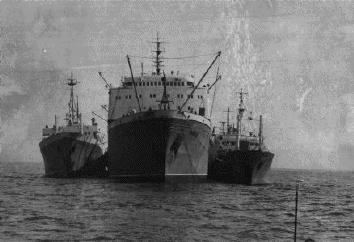 On this day in 1977, a 200-mile territorial fishing zone took effect, with the waters off Cape Cod being one of the two areas where the Coast Guard focused its enforcement efforts. Coast Guard vessels also patrolled the rich fishing grounds near Kodiak, Alaska, to protect American fishermen from foreign competition. “Poachers illegally fishing U.S. waters or taking the wrong kind of fish can be seized,” United Press International reported. Foreign vessels were required to obtain permits to fish within 200 miles of the US coastline, while some coastal areas and species of fish were deemed off-limits altogether. The federal government warned other nations that Coast Guard patrol boats would not hesitate to board foreign fishing boats within the 200-mile limit to ensure compliance. scroll down the page to read the rest of the story here 08:29
On this day in 1977, a 200-mile territorial fishing zone took effect, with the waters off Cape Cod being one of the two areas where the Coast Guard focused its enforcement efforts. Coast Guard vessels also patrolled the rich fishing grounds near Kodiak, Alaska, to protect American fishermen from foreign competition. “Poachers illegally fishing U.S. waters or taking the wrong kind of fish can be seized,” United Press International reported. Foreign vessels were required to obtain permits to fish within 200 miles of the US coastline, while some coastal areas and species of fish were deemed off-limits altogether. The federal government warned other nations that Coast Guard patrol boats would not hesitate to board foreign fishing boats within the 200-mile limit to ensure compliance. scroll down the page to read the rest of the story here 08:29
Labrador fisherman’s lawyers fight to keep his “controlling” agreement with fish processor
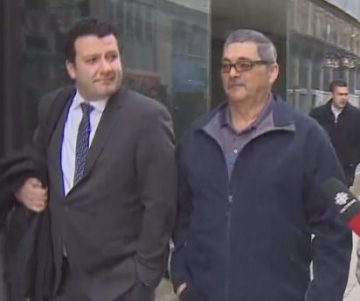 A lawyer for a Labrador snow crab fisherman who had his fishing licence stripped by the federal minister of fisheries said the minister had no authority to do so. Kirby Elson, 62, lost his licence in 2015 because he refused to exit a controlling agreement with two Newfoundland and Labrador fish companies that gave total control of the licence and its wealth to the companies. Byron Shaw, one of Elson’s lawyers, argued Tuesday the minister of fisheries has no authority to interfere in a contract that transfers wealth between a harvester and a third party. He said the policy the Department of Fisheries and Oceans (DFO) is enforcing has nothing to do with the management of fish stocks. The case opened Tuesday at the Federal Court of Canada and is expected to last two days. continue reading the story here Stakes of inshore fisheries case are ‘absolutely massive,’ says observer, Why people are watching this case? continue reading the story here 08:04
A lawyer for a Labrador snow crab fisherman who had his fishing licence stripped by the federal minister of fisheries said the minister had no authority to do so. Kirby Elson, 62, lost his licence in 2015 because he refused to exit a controlling agreement with two Newfoundland and Labrador fish companies that gave total control of the licence and its wealth to the companies. Byron Shaw, one of Elson’s lawyers, argued Tuesday the minister of fisheries has no authority to interfere in a contract that transfers wealth between a harvester and a third party. He said the policy the Department of Fisheries and Oceans (DFO) is enforcing has nothing to do with the management of fish stocks. The case opened Tuesday at the Federal Court of Canada and is expected to last two days. continue reading the story here Stakes of inshore fisheries case are ‘absolutely massive,’ says observer, Why people are watching this case? continue reading the story here 08:04


































